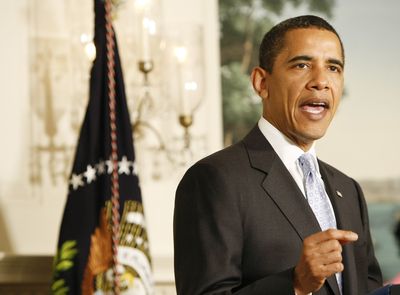Democrats reach budget agreement
Reconciliation shortcut needs only simple majority to pass

WASHINGTON – Congressional Democrats have reached a tentative agreement to authorize use of a legislative shortcut to push President Obama’s sweeping health and education initiatives through the Senate without Republican votes.
Republicans quickly blasted the deal on Obama’s $3.5 trillion budget request, which is scheduled to be considered Monday by a House-Senate conference committee. But the victory appeared to energize the president, who within hours of the agreement issued a challenge to the “army of lobbyists” massing to defeat his plan to cut private banks out of the profitable student loan business and use the savings to expand college aid.
“They are gearing up for battle. So am I,” Obama said Friday at a White House event to tout his education plan. “They will fight for their special interests. I will fight for … American students and their families.”
The procedural shortcut, known as reconciliation, would make it far easier to pass Obama’s student loan plan – which has drawn opposition from lawmakers in both parties – as well as his proposal to expand health coverage for the uninsured. Reconciliation bills are tax or spending measures that cannot be blocked by filibuster, meaning the Senate needs only 51 votes to pass them instead of the usual 60. Democrats now hold 58 Senate seats.
Supporters of Obama’s agenda cheered the agreement. In a conference call with reporters, Education Secretary Arne Duncan called it “a very, very encouraging sign” that Congress will act to “transform the educational opportunities of millions of students for years to come.”
Richard Hirsch, national campaign manager for the liberal group Health Care for America Now, added: “We cannot do the kind of reform that meets the needs if it’s held hostage to people who don’t have a vision for broad reform.”
Republicans and some influential Democrats have opposed using reconciliation, especially for health care, saying it flies in the face of Obama’s pledge of bipartisanship and would poison efforts to produce a health care plan that could win broad support.
“It would make it absolutely clear they intend to carry out their plans on a purely partisan basis,” Senate Minority Leader Mitch McConnell, R-Ky., said in a written statement.
Sen. Kent Conrad, D-N.D., chairman of the Senate Budget Committee, has been among the most vocal opponents of reconciliation. In an interview, Conrad said he is prepared to accept the maneuver as part of a broader agreement that would permit states and nonprofits to continue to administer federally guaranteed student loans.
One of the chief beneficiaries would be the Bank of North Dakota, the nation’s only state-owned bank, which handles 60 percent of student loans in the state and relies heavily on those profits, Conrad said. But nonprofit lending and guarantee agencies in other states would also benefit, increasing political support for the measure.
Industry groups argue Obama’s plan would not save as much as the administration predicts and would destroy jobs in the private lending sector.
Democrats have agreed that reconciliation would “only be used as a last resort,” Conrad said: The budget resolution would instruct congressional committees with authority over education and health care to produce a reconciliation bill by Oct. 15, giving lawmakers months to reach a compromise.
Sen. Max Baucus, D-Mont., chairman of the Senate Finance Committee, said he would push to pass a bipartisan health care bill before the October deadline.